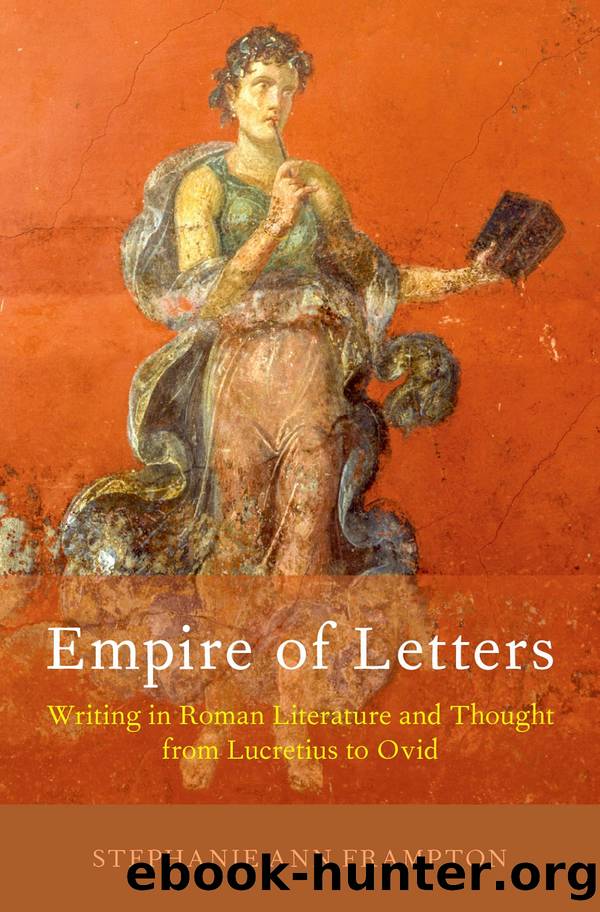Empire of Letters: Writing in Roman Literature and Thought From Lucretius to Ovid by Stephanie Ann Frampton

Author:Stephanie Ann Frampton [Frampton, Stephanie Ann]
Language: eng
Format: epub
Tags: history, Ancient, General
ISBN: 9780190915421
Google: hJSBDwAAQBAJ
Publisher: Oxford University Press
Published: 2019-01-03T00:30:22.644552+00:00
5
The Roman Poetry Book
fata mihi, Caesar, tum erunt mea dulcia, quom tu
maxima Romanae pars eris historiae
postque tuum reditum multorum templa deorum
fixa legam spolieis deivitiora tueis.
ââGallus Papyrus,â lines 2â51
In 1979, a singularly momentous discovery for the history of the Roman book was published in the Journal of Roman Studies: a fragmentary papyrus sheetâall of 19 cm wide and 16 cm high, about the size of a leaf of this book though slightly more squareâcontaining six fragmentary lines of elegiac poetry in Latin and four complete ones (Figure 8). That winter, it had been pulled from waste material long ago thrown into an alleyway at Qasr Ibrîm, an ancient town once known as Primis, which sat for millennia on an outcropping overlooking the Upper Nile River and, since the construction of the Aswan Dam, has occupied a small island in Lake Nasser, one of only a few sites along this part of the ancient Nile still open to researchers.2 Between about 24 and 22 bce, Romans troops held control of the garrison at Primis, and the site has been the source of hundreds of documents in the languages of its various occupationsâCoptic, Greek, Latin, Meroitic, Old Nubian, and Arabicâamong them, this remarkable bit of Latin poetry that was quickly attributed to Cornelius Gallus, the Roman prefect of Egypt between 30 and 26 bce and the first Latin author to become famous for his elegies.3 At the time of the manuscriptâs discovery, Gallusâs most prominent written remains, aside from a single pentameter recorded by the geographer Vibius Sequester, were the traces of his name once inscribed on the obelisk that now stands in the piazza of St. Peterâs at Rome.4 His was a remarkable career, followed by an exceptional fall from grace, when he was recalled by Augustus and forced to commit suicide.5 As Ellen Oliensis remarks, with reference to the epigrams, âIf Gallus had been content to carve his name on papyrus, he might have survived to sing the praises of Caesar.â6
Download
This site does not store any files on its server. We only index and link to content provided by other sites. Please contact the content providers to delete copyright contents if any and email us, we'll remove relevant links or contents immediately.
| Africa | Americas |
| Arctic & Antarctica | Asia |
| Australia & Oceania | Europe |
| Middle East | Russia |
| United States | World |
| Ancient Civilizations | Military |
| Historical Study & Educational Resources |
Machine Learning at Scale with H2O by Gregory Keys | David Whiting(4295)
Never by Ken Follett(3937)
Fairy Tale by Stephen King(3370)
Oathbringer (The Stormlight Archive, Book 3) by Brandon Sanderson(3161)
The Man Who Died Twice by Richard Osman(3072)
Will by Will Smith(2911)
Rationality by Steven Pinker(2352)
Can't Hurt Me: Master Your Mind and Defy the Odds - Clean Edition by David Goggins(2324)
The Dark Hours by Michael Connelly(2300)
Friends, Lovers, and the Big Terrible Thing by Matthew Perry(2219)
The Dawn of Everything: A New History of Humanity by David Graeber & David Wengrow(2197)
Principles for Dealing With the Changing World Order: Why Nations Succeed and Fail by Ray Dalio(2042)
A Short History of War by Jeremy Black(1843)
HBR's 10 Must Reads 2022 by Harvard Business Review(1840)
Go Tell the Bees That I Am Gone by Diana Gabaldon(1754)
A Game of Thrones (The Illustrated Edition) by George R. R. Martin(1725)
Kingdom of Ash by Maas Sarah J(1668)
515945210 by Unknown(1662)
443319537 by Unknown(1546)
